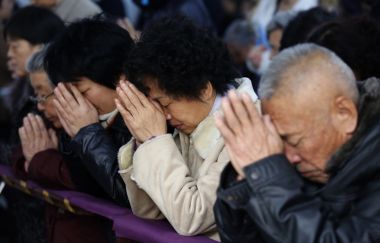Michael Green: If we want to see revival, it starts with prayer, holiness and suffering
We sing about it and pray for it, but what can we be doing if we really want to see a revival of God in our nation?

Veteran theologian Michael Green, author of 'When God Breaks In: Revival can happen again', has surveyed the great Christian revivals throughout history, and drawn out key principles preluding revivals of the past – principles we should follow if we long to see God move in our day as he has done before.
As source material, Green considers the spread of Christianity during the early church, alongside numerous revivals in British and European history – because, he says, all outpourings of the Holy Spirit derive from this source. The revivals he has looked at are (among others) the 14th century revival under Wycliffe, the Reformation in 16th century, the 18th century revival involving Wesley, Whitefield and the Holy Club, and 19th century surge in spirituality which influenced the social reforms advocated by the Clapham Sect, as well as the contemporary movements of God taking place around the world, in particular in Mongolia and China.
The "architect" of these revivals was God alone, says Green. But what are the human conditions that preceded them?
1. Prayer
Passionate, desperate prayer to God for revival is essential, says Green. It was there with Simeon and Elizabeth before God broke in in the incarnation. It was prominent among the Lollards (in the Reformation), the Holy Club (in the 18th century) and the Clapham Sect (in the 19th century). The Chinese church had no other resource but prayer – they had no churches, no Bibles printed, no fellowship allowed, only prayer.
Prayer was also central to the Lewis revival (1949-53 in the Hebrides). Green recalls a meeting with the chief speaker at this revival, Duncan Campbell, who took out a picture from his pocket of two women, aged 82 and 85, who had prayed faithfully for three years before the revival happened. Twice a week between the hours of 10pm and 3am they prayed: "Lord, revive your Church here in the midst of the days." They also later prayed: "Lord, send us your man."
Campbell was well aware, Green says, that it was prayer that had facilitated the revival.
2. Holiness
Green describes the importance of an emphasis on holiness as "just about as unfashionable as prayer". But, he says, it was the "passionate desire to live holy lives [that] marked the people through whom these revivals came".
In the Welsh revival (1904-05), the leaders said that the church had to be changed before the world could be reached. The revival led to the transformation of around 100,000 people in the valleys of south Wales within 9 months, and changed the morality and spirituality of Wales.
3. Awareness of eternal destiny
This is about recognising the issues at stake – gaining heaven or missing out on it – issues of life and death, of heaven and hell. This emphasis was strong at the Reformation as well as in the Wesleyan and Welsh revivals. It was also present among Charles Simeon (the 18th-century evangelical) and Pusey (leader of the 19th-century Oxford Movement), and it is a notable feature in the great revivals going on currently in Singapore and China today. "I think it's something where we [in the Western church] have lost the story," says Green.
4. Return to scripture
Again this is common to all of the movements of God he has studied. It was central at the time of Jesus – Green points to the book of Acts in which there are lengthy quotations from the scriptures. It was also central to the Reformation and the Wesleyan movement. Men like Pusey were the foremost scholars of their day. And Green sees this reflected again in the current thirst for Bibles in China, where the government prints 5 million Bible annually, but this is only a fraction of the number needed.
5. Suffering
All these renewals involve suffering. The early church experienced it, and it was present at the Reformation, and believers in China have also suffered. Is it surprising? asks Green, because we follow a suffering messiah.
"But the Church in the West is terrified of suffering, it can hardly dare to stand up if it bears the risk of a bit of opposition, let alone the risk of suffering."
He adds – quoting Tertullian – "The blood of the martyrs is indeed the seed of the Church."
So, could God revive Europe again? "Yes... if we are prepared to pay the price". Although we cannot "engineer God's intervention", if we are committed to each of these things "we can surely commit the whole of the rest of the thing to God," he says. "We can't control it but at least these [are] the conditions he has often used before."
Michael Green was speaking during a seminar at Spring Harvest in Minehead.











